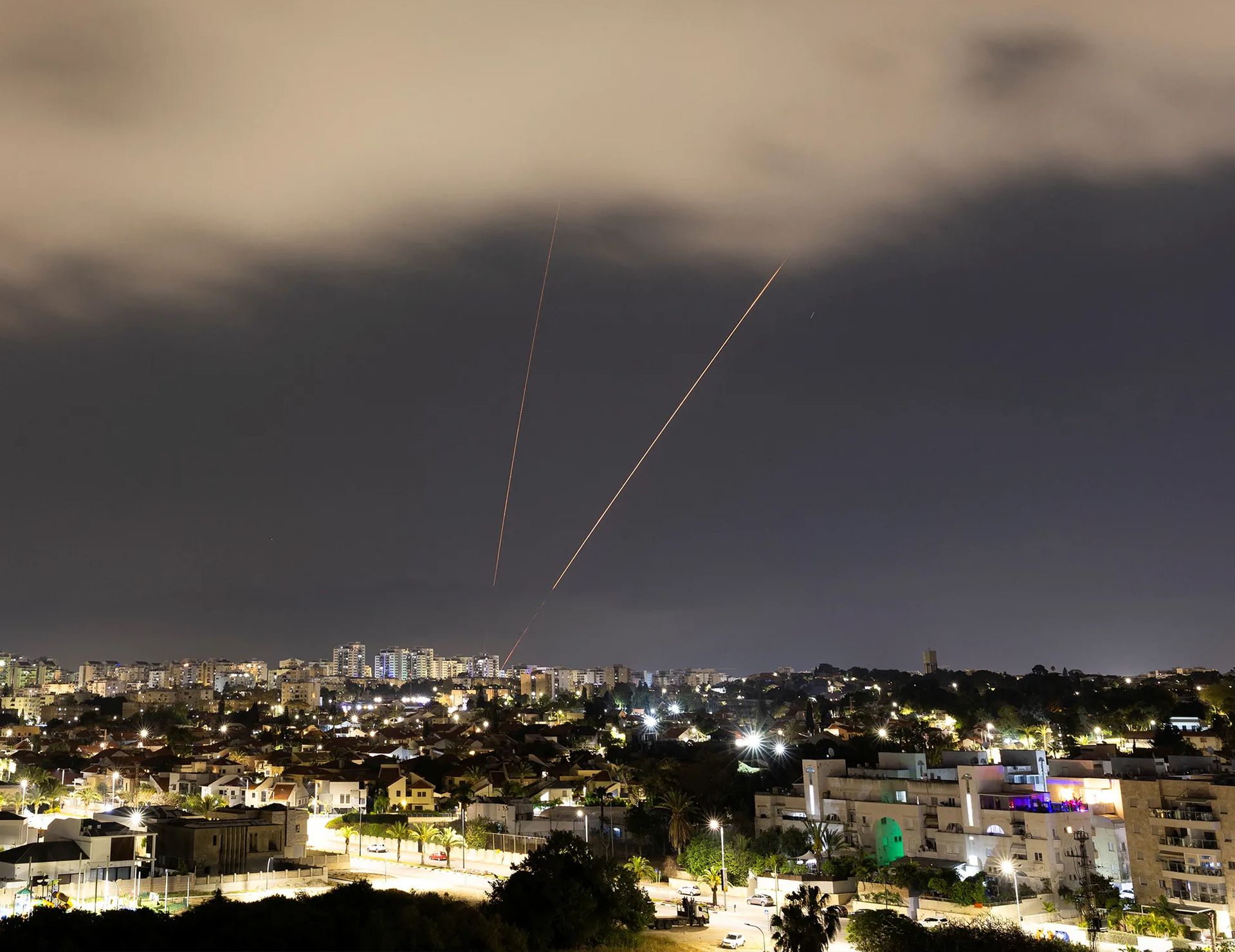Iranian strikes on Israel: A view from Azerbaijan

An anti-missile system operates after Iran launched drones and missiles toward Israel, as seen from Ashkelon. Photograph by Amir Cohen / Reuters
What happened on the night of 14 April and what was Azerbaijan’s immediate reaction?
Mahammad Mehdiyev: On April 14, 2024, Iran launched an unprecedented attack on Israel, marking Iran's first full-scale military assault on the country. The attack was in response to an Israeli airstrike on the Iranian consulate in Damascus, Syria, on April 1, that killed seven Islamic Revolutionary Guard Corps officials, including two generals. Iran had vowed a "serious response" to the attack.
Iran's attack involved over 300 drones and missiles. Lasting about five hours, the assault was intended to overwhelm Israel's air defenses. However, it was largely unsuccessful thanks to the combined efforts of the U.S., UK, Jordan, and Israeli military forces. Despite the scale of the attack, the Iranian strikes resulted in no direct casualties. However, a 7-year-old girl was severely injured by shrapnel from an interceptor missile, and 31 people received treatment for minor injuries or panic attacks. The attack demonstrated Iran's military capabilities as well as its limitations. It also emphasized the tense and complex geopolitical situation in the Middle East.
Azerbaijan, a neighbour of Iran and a partner of Israel, refrained from issuing an official response to Israel's strike on the Iranian consulate in Syria. Alongside Turkmenistan, it was one of the two neighbouring countries of Iran that remained silent on the incident. However, following the Iranian attack, the Azerbaijani Ministry of Foreign Affairs stated on X (formerly Twitter) that Azerbaijan was "deeply concerned over the rising tensions between Iran and Israel" and urged "all parties to exercise restraint and avoid dangerous escalation".
The Topchubashov Center’s team experts have responded to the major questions posed by the latest escalation to figure out what implications it may have for the region and particularly for Azerbaijan, what the possible scenarios and risks are.
What are the major gains and losses for the belligerent parties, as well as the implication of the 14 April events for the region?
Rusif Huseynov: On the one hand, Iran's air attack on Israel can be seen as a logical continuation of the tension between the two countries. On the other hand, however, Tehran's response generated not only serious analysis but also many memes on the Internet. Even after the assassination of Qassem Soleimani, one of the main figures of the Iranian political-military elite, in 2020, Iran's reaction was rather symbolic, as its attack on the U.S. military base was carried out with advance warning and without casualties.
The latest attacks did hardly benefit Tehran both militarily and geopolitically, and could be characterized as a failure as it did not result in significant damage for Israel. Nevertheless, some commentators, especially inside Iran, can present the operation as a success as Israel was targeted and hit directly from Iran for the first time ever. However, in terms of military effectiveness, carrying out an attack from countries that are closer and neighboring to Israel, where Iran operates through proxy groups, and "wearing out" the Iron Dome would have caused greater consequences, if the goal indeed had been to hit the opponent seriously. The conflict`s geopolitical dimension also presents a very bizarre picture: Israel, which was significantly isolated and severely criticized due to the Gaza war in recent months, was defended by Western countries and won the sympathy of international public opinion. Iran's attack seemed to pave Israel's way for the final operation in Gaza and also concerned some Arab countries of the Middle East, who might end up in the West-Israeli coalition against Iran in the upcoming geopolitical configuration.
We can assume that Iran wanted to avoid a major escalation by carrying out a large-scale but very symbolic offensive operation in a short period of time. However, as a result of the process, Iran suffered serious reputational damage and even rendered a great service to the Jewish state by downgrading the importance of the Gaza issue on the international agenda and uniting Western (and possibly some Middle Eastern) countries around Israel.
Iran’s direct attack on Israeli territory and ensuing Israeli response herald a new era of regional power competition in the Middle East with increasing chances of spillover to the neighbouring countries. Where is Azerbaijan in this picture?
Mahammad Mammadov: The timing of mutual attacks between Iran and Israel is important in this context in the sense that it came on the heels of Azerbaijan and Iran putting their bilateral relations on pragmatic rails after two years of diplomatic tensions where Azerbaijan’s growing ties with Israel had been one of the main triggers. In March, in a meeting with his Azerbaijani counterpart Iranian Foreign Minister Amir-Abdollahian said the two countries opened a “new chapter” in their relations solidified by mutual respect for national interests, deeper economic ties, and common interest in the regionalization of international politics in the South Caucasus.
On the other hand, Azerbaijan has been continuing its weapon purchases from and oil supplies to Israel since the October 7 attack, ignoring the Iranian calls to put an oil embargo and other sanctions on Tel Aviv. In this context, the recent hike in Israel-Iran tensions will surely hamper Baku’s ability to have its cake and eat it too. For the time being, Tehran seemed convinced by Azerbaijan’s reassurances that no third country could use its territory to perpetrate an attack on Iran. The fact that Israel’s drone attack and activation of air defense systems in Tabriz near Azerbaijani borders did not generate pushback from Iranian leadership about Azerbaijan’s probable involvement shows Azerbaija-Iran relations have passed this stress test. However, Tehran’s calculations may change in this regard as it may find itself in the middle of a war with Israel.
Taking into account Israel’s strategic importance for Azerbaijan’s balancing policy against Iran, the latter’s well-calculated management of the recent exchange of attacks with Israel without prompting a regional war and bolstering its image among partners while Israel’s growing image of an unpredictable player could create worries in Baku. Tel Aviv’s hands are full with fighting Hamas in Gaza, deterring Hezbollah in the north, continuing a military campaign in the West Bank, and moving into an open fight with Iran which will divert its attention away from other theatres including the South Caucasus. The Netanyahu government’s risky moves in relations with the Western major powers, Turkey, and regional Arab countries increase Israel's alienation in the region, not a dream scenario Azerbaijan wants in the Middle East.
As Iran and Israel now seem intent on de-escalating the situation, we may see the clashes moving back to the shadows where Iran relies mostly on its axis of resistance partners to target Israeli territory while Israel strikes Iranian military personnel and bases in neighboring countries. Azerbaijan has been part of this geopolitical tug-of-war for some time and this new strategic uncertainty will make it increasingly difficult to steer clear of pressures emanating from it.
What has been Türkiye’s reaction to the escalation? Is the Turkish position in contrast to Azerbaijan’s interests?
Simona Scotti: Türkiye has a track record of acting as a mediator in global conflicts, with a department within its Ministry of Foreign Affairs being currently structured to specifically deal with international negotiations. While Egypt and Qatar have been the major regional negotiators in the Israel-Palestinian war, Türkiye has quickly turned into the main channel for the U.S. to communicate with Iran following the escalation between Iran and Israel. Since the beginning of the war, Ankara has showcased an outspoken criticism against Israel’s actions, recently announcing trade restrictions until a ceasefire is reached. Whereas this situation reflects an almost all-time low of relations between Türkiye and Israel, on the other hand Ankara appears to be the ideal actor to back-channel communication between the West and Iran, considering that it is a NATO member whilst enjoying good relations with Iran, with which it shares borders.
While the Azerbaijani and the Turkish foreign policy agendas tend to align on several critical aspects, in this context Baku’s and Ankara’s positions are not mirroring each other, which largely depends on the different security threats and the subsequent system of partnerships that the geopolitical context of the region imposes on the two allied countries. While it is unlikely that major fractions will emerge, there are nevertheless some scenarios that may cause discontent between Azerbaijan and Türkiye. A major spoiler could be represented by a possible extension of the economic restrictions on Israel to include oil imports. Currently, Azerbaijan supplies almost 40% of Israel’s oil demand, which is delivered with the Baku-Tbilisi-Ceyhan pipeline and, from Ceyhan, is then shipped to the port of Ashkelon in the Mediterranean Sea and the port of Eilat in the Red Sea. Shutting down this pipeline would be a move in line with Erdoğan’s pro-Palestine rhetoric, yet it would have far-reaching implications for the region's dynamics. Should Türkiye take the decision to stop enabling Israel’s oil imports through its territory, Azerbaijan would face significant economic repercussions, which could put the two allies at odds. However, the chances that this will materialize are scarce, and it should be taken into account that Türkiye's significance for Iran continues to serve as a main safeguard for Azerbaijan from potential hostile actions from Tehran, which is of primary significance in this volatile environment.
Although the possibility of a large-scale conflict between Iran and Israel doesn’t look very big at the moment, what if it still breaks out? What major risks may be facing Azerbaijan?
Murad Muradov: Iran is Azerbaijan’s major neighbour but also a very difficult partner to deal with, perceived as a potential security threat. On the other hand, Baku has built strong and confidential relations with Israel, which in the recent years has turned into a major arms supplier for Azerbaijan. Iran has been actively using this fact to put pressure on Baku, even accusing it of providing military bases for Israel in the newly liberated territories for a potential conflict with Iran. So in case of a war, Tehran will probably demand some iron-clad guarantees of Azerbaijani neutrality which are of course hard to give. Baku has also been wary of Iran’s close relationship with Armenia. Just lately, IRI’s ambassador in Yerevan, Mehdi Sobhani, claimed that this country remains “a lifeline” for Iran. There is a risk that Tehran may play on revanchist moods in Yerevan and try to re-ignite its conflict with Azerbaijan if it doesn’t behave in a way deemed loyal enough, although with the current government in Armenia, which is not very happy about Iranian influence, this prospect seems unlikely.
Some general risks of a war include an influx of refugees from Iranian Azerbaijan that can put significant socioeconomic pressure on the country. At some point Baku may have to close airspace: the recent strikes prompted most Israeli neighbours, including Egypt, to do it, and Baku is some 250 km north from the Iranian border. A conflict would directly endanger strategic sectors of Azerbaijani economy, energy and connectivity, discouraging any serious investors and severely curtailing Baku’s opportunities for their development. Moreover, given that Azerbaijan is the major oil supplier to Israel, Tehran is likely to put an ultimatum to stop this export.
However, the worst-case scenario is a protracted conflict of middle intensity where neither party can get a decisive breakthrough. It would consolidate the Iranian elite around hardliners, increasing appetite and willingness to project power abroad and act aggressively. Moreover, if Russian confrontation with the West deepens in parallel and Moscow becomes Tehran’s full-fledged ally, the risk is that their interest merges in completely subduing South Caucasus and squeezing the West out once and for all. This can directly threaten Azerbaijani independence or at least deprive it of foreign policy options.











